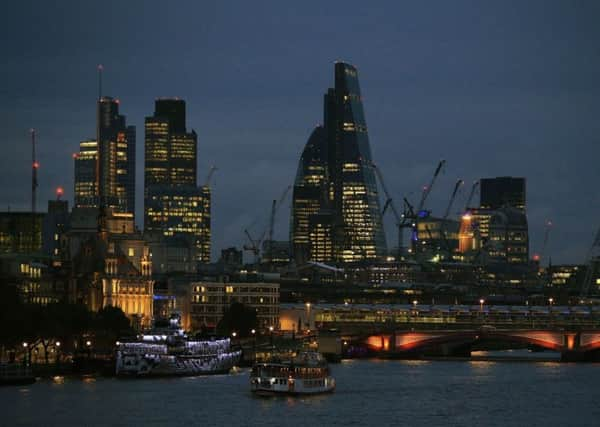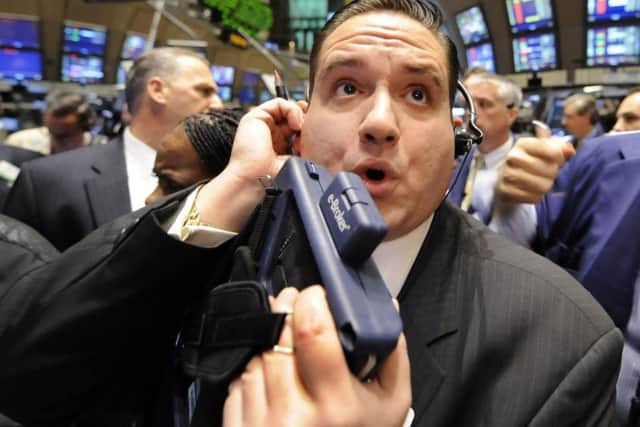Banks '˜failing small businesses' 10 years on from financial crisis


Today marks 10 years since the collapse of US banking giant Lehman Brothers, an event which precipitated the financial crisis that plunged most developed nations into recession, resulting in the loss of thousands of UK jobs.
Analysis of Bank of England figures seen by this newspaper has shown that, despite a large rise in the number of small and medium-sized businesses in Yorkshire and the UK, the availability of capital to help them grow has stalled.
Advertisement
Hide AdAdvertisement
Hide AdIn Yorkshire and the Humber there has been a 17.8 per cent increase in the number of SMEs from 2011 to 2017 yet there has only been a 0.8 per cent increase in the number of bank loans to SMEs in this time.
Nationally, the amount loaned to small companies has declined by 27 per cent since 2009, despite the number of companies in the country overall having increased to more than six million.
Analysts at finance firm Growth Street, which carried out the research, said this level of lending was insufficient to sustain growth for the SME sector and was having a knock-on effect of stifling employment and productivity.
The news comes amid fears for the potential for another downturn in the economy, with commentators warning that lessons from the 2008 crash have not been learnt and that another stock market crash could happen in the very near future. Greg Carter, chief executive of Growth Street, told this newspaper: “If you look at the average amount of lending in January 2009 versus December 2017, there has been a huge gap that has opened up and if business were able to borrow the same amount that they were in 2009 there would be another £18bn of overdraft lending alone, never mind other forms of SME lending.
Advertisement
Hide AdAdvertisement
Hide Ad“So the gap is a lot bigger than we realised and I think that is one of the key factors that is holding back productivity growth in the economy.


“As well all know, the crisis of 2008-09 was not caused by SME. No bank ever went bust lending to SMEs.
“The SME population has been the unfairly-affected bystander. Bank capital requirements have doubled in the past 10 years in terms of how much money they must have in reserve.
“SME loans are required to have more capital held against them than other forms of lending.
Advertisement
Hide AdAdvertisement
Hide Ad“That makes SME lending less profitable than other more standard forms of lending like consumer loans and consumer mortgages.”


Lack of lending to companies is causing a number of problems for businesses, according to Greg Carter, chief executive of financial firm Growth Street.
Mr Carter said the trend particularly affected their ability to invest in automation, causing a slowdown in the growth of wages. “The lack of robots in the UK economy and how far we lag behind the likes of Germany in terms of machines in UK businesses, a lot of that I believe is being held back by lack of availability of SME funding,” he said.
“That has a huge impact on productivity growth and in turn wage growth and in turn on UK growth. It is a really big problem which has just not been addressed.”
Advertisement
Hide AdAdvertisement
Hide AdThe financial crisis resulted in the collapse of major Yorkshire firm Bradford & Bingley, with many other banks having to be bailed out by the taxpayer to the tune of billions, some of which remain in public ownership.
At one stage at the height of the crisis, banks came close to being unable to dispense notes from their cash machines and the crisis left many world nations such as Iceland, Greece and Italy on the verge of going under.
When asked if he had concerns for another economic downturn, Mr Carter said: “With respect to the economy as a whole I would agree that we are very far into a full market following the last major recession. And history tells us that eventually markets will turn. There are a number of threats both domestically and internationally that could cause the economy to turn.”
Labour’s shadow chancellor John McDonnell will today give a speech denouncing the banking industry’s role in the crash.
Advertisement
Hide AdAdvertisement
Hide AdHe will say: “Most now accept that the crash was caused by a combination of greed and deregulation that turned the City into a multibillion pound casino.
Mr McDonnell will say: “The crash also exposed how far the balance in the role of the City had been tipped away from securing long term investment in our economy towards short term high stakes gambling.”